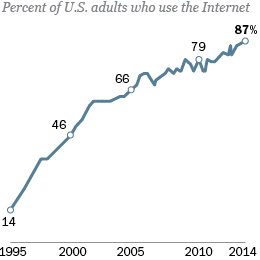The Web at 25 in the U.S. [REPORT]
March 1, 2014
![]() The overall verdict: The internet has been a plus for society and an especially good thing for individual users
The overall verdict: The internet has been a plus for society and an especially good thing for individual users
This report is the first part of a sustained effort through 2014 by the Pew Research Center to mark the 25th anniversary of the creation of the World Wide Web by Sir Tim Berners-Lee. Lee wrote a paper on March 12, 1989 proposing an “information management” system that became the conceptual and architectural structure for the Web. He eventually released the code for his system—for free—to the world on Christmas Day in 1990. It became a milestone in easing the way for ordinary people to access documents and interact over a network of computers called the internet—a system that linked computers and that had been around for years. The Web became especially appealing after Web browsers were perfected in the early 1990s to facilitate graphical displays of pages on those linked computers.
 It thus became a major layer of the internet. Indeed, for many, it became synonymous with the internet, even though that is not technically the case. The internet is rules (protocols) that enable computer networks to communicate with each other. The Web is a service that uses the network to allow computers access files and pages that are hosted on other computers. Other applications that are different from the Web also exploit the internet’s architecture to facilitate such things as email, some kinds of instant messaging, and peer-to-peer activities like internet phone calling through services like Skype or file sharing through torrent services.
It thus became a major layer of the internet. Indeed, for many, it became synonymous with the internet, even though that is not technically the case. The internet is rules (protocols) that enable computer networks to communicate with each other. The Web is a service that uses the network to allow computers access files and pages that are hosted on other computers. Other applications that are different from the Web also exploit the internet’s architecture to facilitate such things as email, some kinds of instant messaging, and peer-to-peer activities like internet phone calling through services like Skype or file sharing through torrent services.
Using the Web—browsing it, searching it, sharing on it—has become the main activity for hundreds of millions of people around the globe. Its birthday offers an occasion to revisit the ways it has made the internet a part of Americans’ social lives.
This first report looks back at the rapid change in internet penetration over the last quarter century, and covers new survey findings about Americans’ generally positive evaluations of the internet’s impact on their lives and personal relationships. In the coming months, the Pew Research Center’s Internet Project in association with Elon University’s Imagining the Internet Project will further mark the 25th anniversary of the Web by releasing eight reports about emerging trends in digital technology that are based on surveys of experts about the future of such things as privacy, cybersecurity, the “internet of things,” and net neutrality. We will also explore some of the economic change driven by the spectacular progress that made digital tools faster and cheaper. And we will report on whether Americans feel that the explosion of digital information coursing through their lives has helped them be better informed and make better decisions.
To read full report CLICK HERE.




























